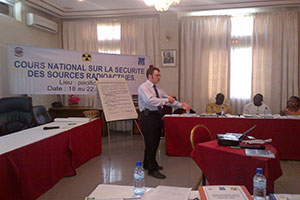Securing Radioactive Sources Around the World
How CNSC experts support IAEA training worldwide
October 27, 2014
Every year, experts from the Canadian Nuclear Safety Commission (CNSC) travel around the world to share their best practices for securing nuclear sources with experts from other states.
These events – led by the International Atomic Energy Agency (IAEA), on behalf of states and national organizations who have requested training – are part of the CNSC’s extensive commitment to secure nuclear materials and nuclear technology, both in Canada and abroad.
As a world leader in the safety and security of nuclear materials, Canada’s nuclear policies and procedures make the CNSC a respected international expert on securing radioactive sources.
In particular, the CNSC’s performance-based approach ensures that licensees meet all safety and security guidelines, while also providing flexibility for particular sites or activities.
Supported by funding from the Government of Canada, CNSC experts travel to states or regions with identified needs and provide technical assistance in developing local capacity to manage and secure radioactive sources for a variety of applications.
Since 2012, the Government of Canada has contributed over $2.2 million through its Global Partnership Program to manage and secure highly radioactive sources used in beneficial applications (such as cancer treatment) in countries or regions with identified needs.
One of these experts is Raphael Duguay, Security Advisor, who in the past 18 months has travelled to Africa, Asia and the Americas, teaching IAEA and World Institute for Nuclear Safety courses on securing radioactive sources.

The CNSC's Raphael Duguay, Security Advisor, in Ougadougou, Burkina Faso, August 2014
“We work to provide government agencies that may deal with radioactive sources the expertise they need to manage and secure them. In addition, we look to identify the roles and expertise of various government agencies to develop working connections between them; this allows states to best coordinate government efforts and ensure the safety and security of radioactive sources” explains Raphael.
The courses seek to cover a wide range of materials and situations. They enhance knowledge on radioactive sources, potential threats, consequences, adequate regulations and training, and incident management techniques.
They also provide host nations with a framework for detecting, intervening in, investigating, and responding to incidents involving radioactive sources.
Beyond strictly technical matters, instructors also educate participants on the work of the IAEA. Besides providing support for these courses, Raphael notes “The IAEA provides the basis for our work, and so we provide participants with information regarding international nuclear legislation, best practices endorsed by the IAEA, and the support that the IAEA can offer states to develop their abilities to secure radioactive sources.”
Given that Canada is a leading exporter of radioactive sources, the Government of Canada – through the Department of Foreign Affairs, Trade and Development and the CNSC – supports the delivery of these courses, to further ensure international security.
These activities are also supported through the development of bilateral agreements with other states on the secure and peaceful use of nuclear materials.
Page details
- Date modified:
